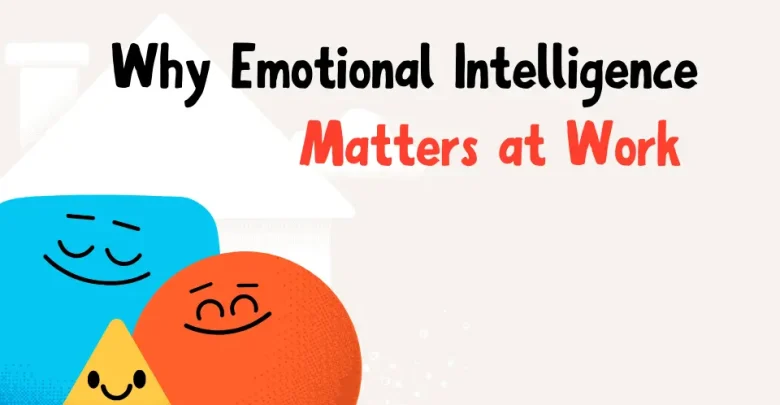Why Emotional Intelligence Matters at Work

In today’s fast-paced, competitive work environment, technical skills and experience are no longer the sole determinants of success. While expertise and knowledge are crucial, emotional intelligence (EQ) has emerged as a significant factor in fostering professional relationships, improving performance, and driving success in the workplace. Emotional intelligence mentions to the aptitude to identify, comprehend, manage, and result one’s own spirits and persons of others. But why does emotional intelligence matter so much at work?
Improved Communication and Collaboration
One of the primary reasons emotional intelligence is essential in the workplace is that it enhances communication. People with high EQ are better at expressing their thoughts clearly and understanding the emotions behind others’ words. They recognize non-verbal cues such as body language, tone of voice, and facial expressions, which are often critical in determining how someone feels beyond what they say.
In a work setting, this skill enables individuals to communicate more effectively, fostering stronger relationships with colleagues, clients, and managers. Teams that have members with strong emotional intelligence often collaborate more seamlessly. When people can empathize and relate to each other’s perspectives, it’s easier to work towards common goals, avoid misunderstandings, and resolve conflicts quickly.
You can read more article :
- How to Give Constructive Feedback Without Hurting Feelings
- Why Adaptability Is a Key Skill for Modern Professionals
- How Emotional Intelligence Can Improve Your Negotiation Skills
Conflict Resolution
Conflict is unavoidable in any office, but in what way it is touched can either build or injury relatives. Emotional intelligence plays a vital role in conflict resolution by helping individuals navigate emotionally charged situations with empathy and tact. A person with high EQ can remain calm under pressure, listen actively to all parties involved, and seek a solution that satisfies everyone.
Emotionally intelligent individuals are less likely to take things personally and can separate their emotions from the issue at hand. This level of emotional control reduces the likelihood of escalating tensions, which often occurs when people react impulsively or defensively. Conflict resolution becomes more about solving the problem rather than winning an argument, creating a more harmonious workplace environment.
Enhanced Leadership Abilities
Leaders with emotional intelligence tend to be more successful because they can connect with their team on a personal level. Understanding the emotions of team members allows leaders to motivate, inspire, and build trust. A leader who is emotionally aware can provide constructive feedback without demoralizing their team, recognize when someone is struggling, and offer support before issues escalate.
Leadership isn’t just about giving orders or making decisions; it’s also about understanding the human element of management. Leaders with high EQ can adapt their management style to the needs of their team, whether it involves offering encouragement, being a good listener, or providing a calming presence during stressful times. These qualities help create a positive work culture where employees feel valued and supported.
Better Decision Making
While emotions are often viewed as irrational or detrimental to decision-making, the reality is that they play a significant role in how decisions are made. Emotional intelligence helps individuals recognize how emotions influence their choices and enables them to make more balanced, thoughtful decisions.
For example, a manager who is emotionally intelligent is more likely to consider how their decision will affect the team, not just the bottom line. They can weigh both emotional and logical factors, ensuring that their choices benefit the organization without causing unnecessary stress or dissatisfaction among employees.
In contrast, low emotional intelligence can lead to impulsive decisions driven by frustration or anxiety, which often have negative consequences. By managing emotions and considering others’ feelings, emotionally intelligent individuals make decisions that are well-rounded and sustainable.
Increased Employee Engagement and Productivity
Emotional intelligence directly impacts employee engagement and, in turn, productivity. When managers and leaders demonstrate empathy and emotional awareness, employees feel more understood and appreciated. This leads to augmented job gratification, higher confidence, and a intelligence of belonging within the group.
Employees who work in environments where emotional intelligence is valued tend to be more motivated and committed to their roles. They are less likely to experience burnout or stress, as emotionally intelligent leaders and coworkers create a supportive environment that prioritizes mental and emotional well-being.
Additionally, employees who feel emotionally connected to their work are more likely to contribute innovative ideas, collaborate effectively, and take pride in their contributions. All of these factors lead to improved productivity and better overall performance.
Fostering a Positive Work Culture
A workplace that values emotional intelligence is often characterized by open communication, mutual respect, and trust. In such environments, employees feel safe to express their opinions, share concerns, and seek help when needed. Emotional intelligence fosters inclusivity, helping to create a work culture where diversity is celebrated, and everyone feels valued.
Teams that emphasize emotional intelligence tend to have higher levels of psychological safety, meaning employees are not afraid to take risks, voice new ideas, or make mistakes. This optimistic effort philosophy inspires growth, innovation, and lasting achievement.
Conclusion
In the modern workplace, emotional intelligence is more than just a nice-to-have quality—it’s a crucial skill that can significantly impact communication, conflict resolution, leadership, decision-making, and overall job satisfaction. By developing emotional intelligence, individuals can enhance their relationships with colleagues, improve their performance, and create a more positive work environment. As businesses continue to prioritize employee well-being and collaboration, emotional intelligence will play an even more critical role in shaping the future of work.
This article provides a professional, informative approach to the topic while emphasizing the real-world importance of emotional intelligence at work.

